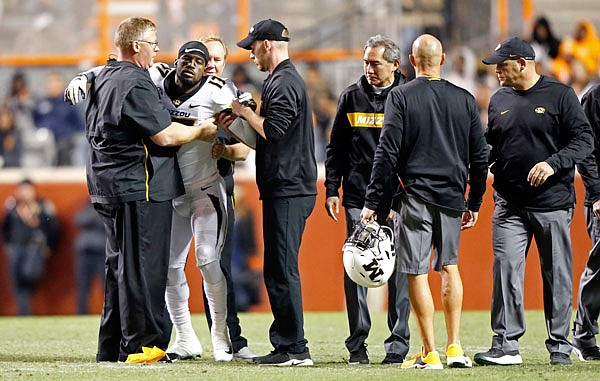The NCAA needs to re-work its targeting rule.
It should stay in place, in some form or fashion, because the link between concussive and sub-concussive blows in all sports and brain injuries like CTE is becoming more clear. If that kind of contact can be prevented in games with a rule, it's a worthwhile goal.
But as it's currently implemented, targeting entirely favors the offense, or whichever player has the ball in his hands. Three players were ejected for targeting during Missouri's 50-17 win Saturday against Tennessee, two of them Tigers. But it hardly seems fair to say Tavon Ross, who tackled Volunteer wide receiver and punt returner Marquez Callaway while leading with his head and was penalized as Callaway lowered his head to brace for contact, committed the same rules violation as Tennessee's Shannon Reid, who knocked Missouri WR/punt returner Richaud Floyd out cold.
In defense of the officials, Ross' ejection is by the letter of the rule and a call that has been made the same way all over college football this season. But it gives an offensive player - one who is not defenseless, but looking upfield and ducking to brace for impact as a defensive player aims for the midsection of the ball carrier as is taught - a distinct advantage.
Floyd, on the other hand, was defenseless. Already wrapped up by two Tennessee tacklers, Reid launched at Floyd's upper chest/neck and hit Floyd so hard he knocked the ball out of Floyd's hands, even though Reid didn't touch the ball until he landed on Floyd's body after the hit.
Floyd was face down on the ground and immobile for a brief while, then was moving his legs, and had to be helped off the field by medical staffers. Floyd was then taken to a hospital on a stretcher from the locker room for further evaluation.
Ross shouldn't have led with his helmet and probably got the worst of the lick he tried to give Callaway, who later left and then returned to the game after a different hard hit, and Callaway's injury status was not updated after the game.
I'm not saying Tennessee played dirty, or patronize players that realize the danger inherent in the game of football and, in some cases, willingly embrace the hard hits. The team with a wideout in the hospital could have been reversed and the point would still stand: it's not just fans who are confused by how the rule is enforced, but often players and coaches, too.
It may be impossible for the NCAA to completely eliminate the judgment calls officials make, and therefore the controversy that can follow a targeting ejection. Giving the officials some leeway or guidance on what to do if an offensive player initiates the contact or lowers his helmet to meet a defender might help.
The rule reads as follows: "No player shall target and make forcible contact to the head or neck area of a defenseless opponent with the helmet, forearm, hand, fist, elbow or shoulder. This foul requires that there be at least one indicator of targeting. When in question, it is a foul."
The indicators include: a player launching, or leaving his feet to make contact around the head or neck; surging upwards out of a crouch to make head or neck contact while keeping one or both feet on the ground; leading with any part of the upper body to make contact at the head or neck area; and lowering the head before initiating contact with the crown of the helmet. The rule also gives situational definition of a defenseless player. Callaway tried to juke Ross and looked like a ballcarrier, but Ross' leading with the crown of his helmet made the call easy for officials.
The NCAA probably won't change the rule, at least not after this season, and teams will have to continue to adjust, or else eat the yardage penalty and ejection. But Saturday in Knoxville, and elsewhere around the country this fall, it's felt like there should be two tiers of targeting, akin to roughing versus running into the kicker.
The Tigers will have Ross, and hopefully Floyd, back for the first half Friday against Arkansas. Nate Anderson, ejected for targeting on Tennessee quarterback Keller Chryst with nine minutes to play, will miss the first half.

